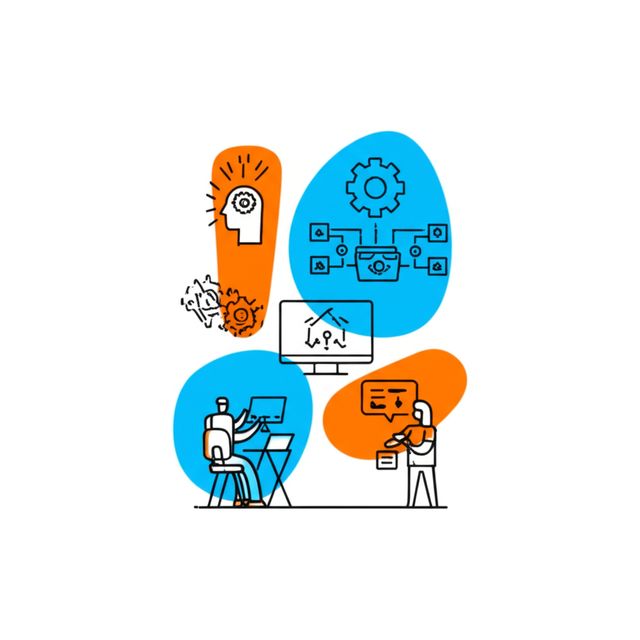Machine Learning Workflow
Machine learning workflow encompasses a structured set of steps that guide data scientists and machine learning engineers through the process of developing and deploying machine learning models. It provides a systematic approach to ensure that machine learning projects are executed efficiently and effectively. Understanding machine learning workflow is crucial for anyone interested in gaining proficiency in this field.
Why Learn Machine Learning Workflow?
There are several compelling reasons to learn machine learning workflow:
- Structured approach: Machine learning workflow provides a clear and organized framework for machine learning projects. It helps ensure that all necessary steps are followed, reducing the risk of errors and omissions.
- Improved efficiency: By following a structured workflow, data scientists can streamline their work and avoid unnecessary rework, leading to increased efficiency.
- Collaboration: Machine learning workflow facilitates collaboration by establishing a common set of processes and terminologies. It allows team members to work together more effectively and share their knowledge.
- Reproducibility: A well-defined workflow ensures that machine learning projects can be reproduced and replicated by others, promoting transparency and accountability.
Online Courses for Learning Machine Learning Workflow
There are numerous online courses available to help learners master machine learning workflow. These courses cover various aspects of the workflow, including data preparation, model training, evaluation, and deployment. They provide a convenient and flexible way to acquire the necessary skills and knowledge.
Skills and Knowledge Gained from Online Courses
Online courses on machine learning workflow equip learners with a comprehensive set of skills and knowledge, including:
- Understanding the different stages of the machine learning workflow.
- Proficiency in data preparation techniques, such as cleaning, transforming, and feature engineering.
- Ability to select and train appropriate machine learning models.
- Skills in evaluating model performance and interpreting results.
- Knowledge of model deployment techniques and best practices.
Benefits of Learning Machine Learning Workflow
Learning machine learning workflow offers numerous benefits, both for personal and professional development:
- Enhanced problem-solving skills: Machine learning workflow teaches structured problem-solving techniques that can be applied to a wide range of challenges.
- Increased employability: Machine learning skills are in high demand across industries, making individuals with expertise in machine learning workflow highly employable.
- Career advancement: Mastery of machine learning workflow can lead to career advancement opportunities in data science, machine learning engineering, and related fields.
Tools and Technologies
Machine learning workflow involves working with various tools and technologies, including programming languages (such as Python and R), machine learning libraries (such as TensorFlow and scikit-learn), cloud platforms (such as AWS and Azure), and data visualization tools (such as Tableau and Power BI).
Personality Traits and Interests
Individuals interested in machine learning workflow typically possess certain personality traits and interests, including:
- Analytical mindset with strong problem-solving abilities
- Attention to detail and accuracy
- Curiosity and eagerness to learn
- Interest in mathematics, statistics, and computer science
- Passion for working with data and solving real-world problems
Projects for Learning Machine Learning Workflow
To enhance their understanding of machine learning workflow, learners can undertake various projects, such as:
- Developing a machine learning model to predict customer churn.
- Building a recommendation system for a streaming service.
- Creating a natural language processing model for sentiment analysis.
Projects for Professionals Using Machine Learning Workflow
In their day-to-day work, professionals who use machine learning workflow engage in projects such as:
- Developing machine learning models for fraud detection.
- Optimizing supply chain management using machine learning.
- Creating personalized marketing campaigns using machine learning.
How Online Courses Aid in Understanding Machine Learning Workflow
Online courses provide a range of resources and activities that facilitate a comprehensive understanding of machine learning workflow, including:
- Lecture videos: Online courses provide video lectures delivered by subject matter experts, which cover the core concepts and techniques of machine learning workflow.
- Projects and assignments: Learners have the opportunity to apply their knowledge through hands-on projects and assignments that simulate real-world scenarios.
- Quizzes and exams: Quizzes and exams help assess learners' understanding and reinforce key concepts.
- Discussions: Online courses often facilitate discussions where learners can engage with peers, ask questions, and share their insights.
- Interactive labs: Many courses offer interactive labs that allow learners to experiment with machine learning algorithms and tools in a simulated environment.
Are Online Courses Sufficient?
While online courses provide a valuable foundation for learning machine learning workflow, they may not be sufficient for a complete understanding. Practical experience through hands-on projects and real-world applications is essential for developing proficiency. However, online courses can serve as an excellent starting point for individuals seeking to enter the field of machine learning.


